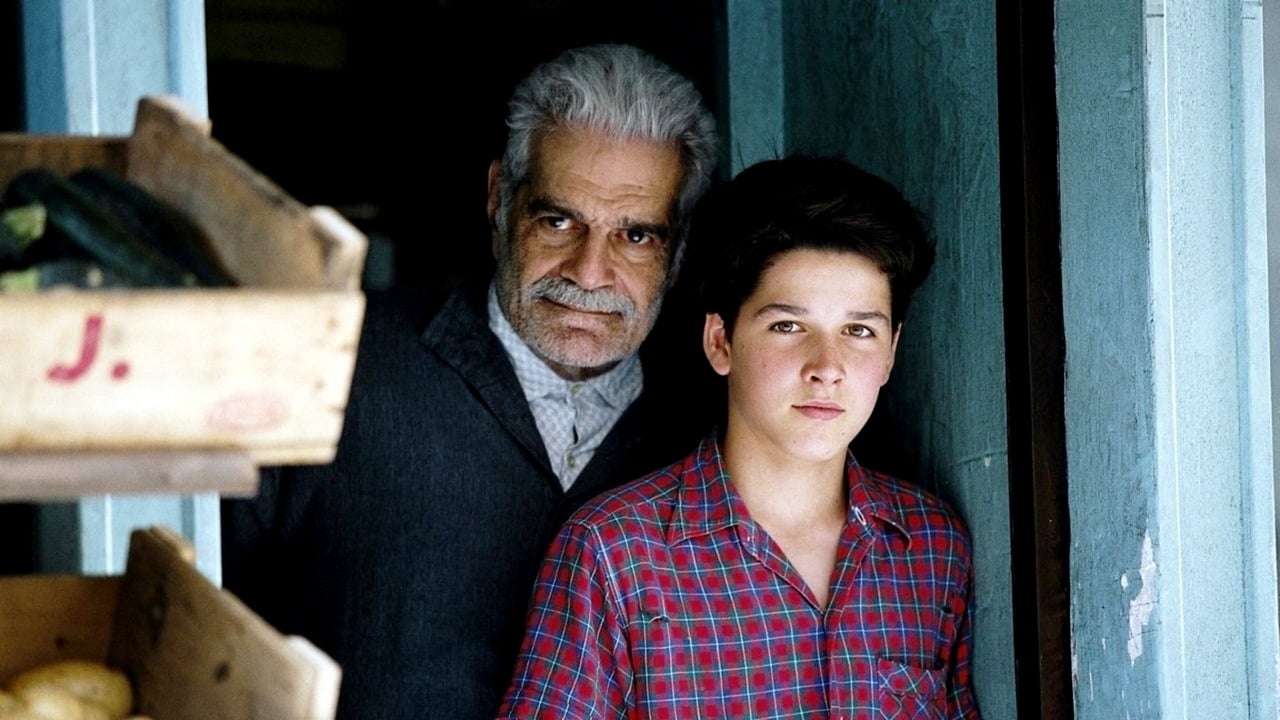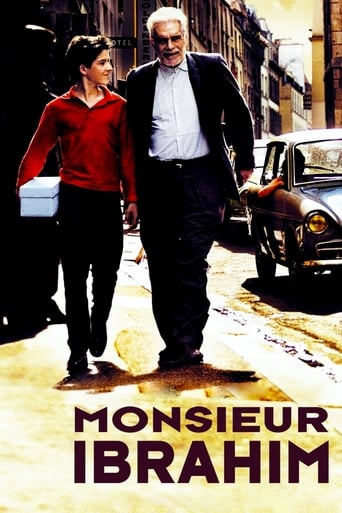Hellen
I like the storyline of this show,it attract me so much
Tetrady
not as good as all the hype
Darin
One of the film's great tricks is that, for a time, you think it will go down a rabbit hole of unrealistic glorification.
Ahmed Khaled
Great movie, but the big question here is: Is it legal to involve the kid protagonist in a relatively sexually explicit scene with Anne Suarez ?.. In Exorcist, there was a body double for Linda Blair in her explicit scenes, but there is no such thing here. As regards the movie, I feel it is the same tune of Zorpa the Greek played in another form. Being Muslim, I think the script writer knows nothing about Quran and Islam. Omar Sheriff talks more like a Buddhist monk than a Muslim Sheikh. However, such errors don't deny the great beauty and the great tolerance message delivered by the movie. It gives U enough time to think and meditate.
drslop
In reading some of the comments here, I wondered if I had seen the same movie.We are being told a story that consists entirely of Momo's memories, impressions and, possibly, fantasies of when he was growing up.So it seems strange that, for example, some reviewers complain here that there is not enough formal comparative religion or, God/Allah/Yahweh help us, that the film is antisemitic.I also wondered why no-one (apparently) mentioned what Momo found inside M. Ibrahim's Koran (which surprised and intrigued me) and what that might mean.The message boards didn't help much -- and there was more ranting about more or less nothing and "facts" that seems unlikely, to say the least.Then I found the author's site and things started to make a lot more sense.Eric-Emmanuel Schmitt tells us that Momo and Monsieur Ibrahim are two people who pass unnoticed through the world. Momo is an only child with no mother, and a father who barely deserves the name of 'father', too sunk in depression to take care of his son and bring him up, or teach him and hand on to him a taste for life and its principles. As for Monsieur Ibrahim, the only thing anyone asks of him is that he give them the correct change. Both man and boy change their lives as they get to know one another. Their encounter is a marvelous enrichment.The author notes that there has been a lot of verbiage about the fact that the child is Jewish and the grocer Muslim -- "Rightly so. It was a deliberate move to create them like that. I set out to prove something and be provocative. What I wanted to prove was that in many places in the world (European capitals, ports, American cities, North African villages), people of different religions from different backgrounds live together in harmony. In Paris, Rue Bleue, the road where this story takes place and where I once lived and which definitely isn't blue, was largely inhabited by Jews with a few Christians and Muslims. They all shared not only the same street, but daily life, their joys, discontents and conversation. Friendships or mutual understanding developed among these people who came from just about everywhere, either geographically or spiritually. In this unpretentious quartier down from Montmartre, I felt I was living somewhere rich and burgeoning, where cultures met, took an interest in each other and joked about their differences."Also, when Momo is handed Monsieur Ibrahim's old Koran, he finds what was in it -- dried blue flowers. The Koran is the text but it is also what Monsieur Ibrahim has placed in it -- his life, his way of reading, his interpretation. According to the author, "spirituality is not about repeating sentences parrot-fashion, but about grasping the meaning and understanding the concept and shades of meaning, the implications. True spirituality is only worthwhile when obedience and freedom are balanced".There is a quite a bit more that you may find useful and interesting - search "Eric-Emmanuel Schmitt" if you want to explore further.
MartinHafer
The first half of the movie was not especially compelling--especially since so much of this concerns a very young appearing 16 year-old boy and his experiences in procuring prostitutes. While this may or may not bother the sensibilities of French audiences, I found it awfully sleazy and unengaging. The kid appeared about 13 or 14 and scenes such as him breaking open his piggy bank to get enough for a trick were quite strange.The second half of the movie, in contrast, was a sweet and engaging story about the young man and his relationship with a shopkeeper (Omar Sharif). When the boy's father dies, Sharif adopts the boy and takes him on a long road trip to his homeland of Turkey. The acting is good and the story unusual enough that it is worth a look.
Boris Todorov
This is a reply to a couple of rather rash and inconsiderate comments above, done by people who apparently not only live in a world of hatred and mistrust but cannot even assess the obvious messages in an easy-going, unambiguous and outspoken story.This movie has nothing to do with RELIGIOUS PROPAGANDA! Mr Ibrahim does NOT at any point try to proselytize Moise. Moise does NOT change his name, does NOT change religion and does NOT deny his roots. He was adopted for personal, and not confessional reasons.The author of the novel upon which the movie is based is a French Jew by the same name as the main character. This quite easily explains why the boy had to be Jewish and not, let's say, Christian, for that matter. To see propaganda here is a proof of bad taste.Momo was poor and an obviously bad student - he had no bright future which to sacrifice, that is why he settled himself with the grocery store, not because he was proselytized to adopt Arab ways.Mr Ibrahim made it quite clear that his wisdom does not come from the Koran, but from life, he was a half-literate man, he led a secluded life, he attended no prayers, he did not speak of the Prophet or whoever. He quoted the Koran only on matters of love because this is what interested him. What Mr Ibrahim knew "was in his Koran", which apparently escaped the attention of the paranoic Muslim-haters above, were the two flowers (hey, they are part of the title of the movie!), a remembrance of his long-dead wife and love of his life.This was a movie about how religious messages may be perceived in a spirit of love and harmony with the world and not in terms of self-seclusion, mutual suspicion and hatred. Yes, the visits to the churches and mosques were a little too naively funny to be convincing, but the message was easy to grasp - there is A LEVEL OF PERSONAL RECEPTION of religious messages, the "inner religion" about which young Moise was wondering what it meant, which is equally easy to approach by all adepts to all confessions.I actually did not like the movie that much - the plot was partly lame and too fairy-tale-like for such a "show-life-as-it-is" kind of movie. But I felt obliged to write this comment in order to defend it against undeserved xenophobic slanders.

